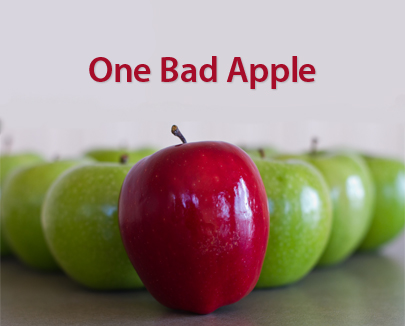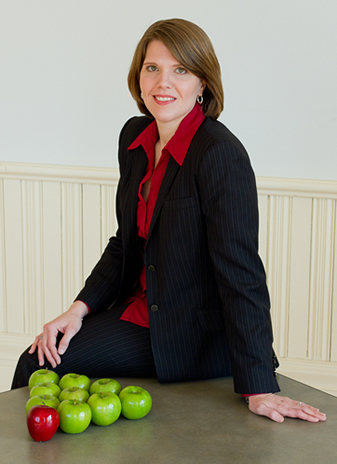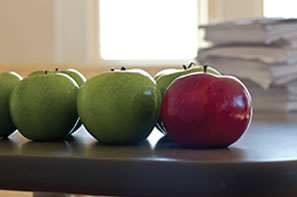One Bad Apple

The seeds of a fertile research career can be sown in unlikely places. For Queen’s School of Business Associate Professor Jana Raver, a fascination with organizational behaviour can be traced to a brief stint working in a dysfunctional office in the late 1990s. After graduating from the University of Florida with a BSc in Psychology, she landed a job as an executive assistant to an office manager who turned out to be tyrannical. “She made her employees’ lives hell,” Jana recalls, cringing at the memory. “Since I was her assistant, everyone would come to me, so I acted as the toxin handler. The experience left a lasting impression that eventually influenced my research interests
In the years since, Jana has moved from toxin handler to organizational immunologist. She has built an international reputation for her scholarship in interpersonal relations, group processes and culture. Her drive to explore the dark side of work life—to understand how and why we undermine one another and how behaviours can be shaped for the better—has earned her publication of her articles in blue-chip journals such as Science and the Academy of Management Journal, grants from the Social Sciences and Humanities Research Council, mentions in the national and international media, and awards for her research.
It’s also won the admiration of her colleagues. Says Julian Barling, QSB Professor of Organizational Behaviour and a Queen’s Research Chair, “Jana’s research is invariably of the highest quality. There are very few business school professors who have published the results of their research in the prestigious journal Science, as Jana has.”
Her research is not only on one of the hottest topics in organizational behaviour, it’s also attracting the attention of lawmakers intent on reducing the incidence of workplace bullying.
 Jana was ahead of the curve a decade ago when she began her post-graduate studies. After her close encounter with the boss from hell, she attended the University of Maryland and, in 2004, completed her PhD. During those years, much of her research focused on sexual harassment and interpersonal aggression at work.
Jana was ahead of the curve a decade ago when she began her post-graduate studies. After her close encounter with the boss from hell, she attended the University of Maryland and, in 2004, completed her PhD. During those years, much of her research focused on sexual harassment and interpersonal aggression at work.
“At the time of my dissertation, people in Europe were talking about issues of hostile treatment in the workplace, but it wasn’t being covered as much in North America,” says Jana, who arrived at QSB in 2004. “I’m from the US, and to this day there’s not a lot of attention paid to understanding workplace aggression there. That’s one of the things that attracted me to Canada. There seemed to be greater respect for and focus on these issues here.”
Her research has uncovered uncomfortable observations about life in organizations and team dynamics. A case in point is her study of “destructive criticism,” the withering, disrespectful feedback that attributes poor performance to a person’s character: “You’re an incompetent presenter” or “You suck at financials,” for example. Working with Jaclyn Jensen and Junghyun Lee of George Washington University and QSB graduate Jane O’Reilly, MBA’00, who is now at the University of British Columbia, Jana looked at how different types of people perceive and respond to such criticism.
The researchers focused on trait competitiveness—the degree to which people define themselves as being superior to others and strive to maintain superiority—a key factor that influences how people interpret criticism. They devised two experiments involving undergraduate students. In the first, students completed a screening survey to assess their level of competitiveness. The students read a case scenario and were asked to imagine themselves as consultants working on a project for a client. They received either constructive or destructive criticism from a peer, and then responded to questions assessing their perceptions of the criticism and their motivation to perform afterwards.
In the second study, participants were told they would be working in teams of two on a complex task to create words from a collection of letters. They were actually paired with an experimental confederate posing as a student, who was tasked by the researchers to deliver constructive or destructive criticism. Actual performance levels were assessed based on the students’ performance after receiving criticism.
Jana and her colleagues found highly competitive people on the receiving end of destructive criticism are indeed motivated and say they will work even harder to prove themselves and maintain their superiority. However, they actually perform worse. They perceive the criticism as an attack on their self-identity, so their performance suffers as they obsess over the criticism rather than bear down and perform the task at hand. “Interestingly, highly competitive people say they are motivated toward higher performance, but they can’t translate that into effective performance on a complex task,” Jana explains.
People scoring low on competitiveness don’t have such issues. They may not like experiencing destructive criticism, but their jobs are not as central to their identity. As a result, when faced with such harsh feedback, they are better able to focus on doing what’s necessary to better perform the task. Perversely, it may even motivate them.
“I’d never advocate destructive criticism as a managerial style,” Jana says. “However, people who aren’t very competitive, who don’t seem to care much about their performance, occasionally need a wake-up call. There was something about the harshness of feedback that motivated them to change. That surprised us. We didn’t expect people low on competitiveness to perform better when the criticism was destructive.”
Increasingly in her research, Jana is trying to understand the nuances of team dynamics and their bigger implications in the workplace. “When you study the dark side of organizations,” she says, “eventually you have to study how to overcome it.” One of her recently published studies, for example, looks at the impact of highly agreeable and disagreeable people (“good eggs” and “bad apples”) on overall team performance. Jana and colleagues Mark Ehrhart of San Diego State University and QSB doctoral student Ingrid Chadwick studied the performance of 47 student teams working on a semester-long project at the School. The students first completed personality tests to measure how well they scored on key factors such as agreeableness, conscientiousness, concern for others and a personal belief in helping others. They were then randomly assigned into teams. At intervals during the project, students filled out questionnaires on how they felt others in their groups were contributing.
Jana and her colleagues found that students who were abrasive and didn’t care what others felt had a particularly strong and corrosive impact on team collaboration, which eventually rubbed off on others and created dysfunctional dynamics. By the sixth week, a familiar conversation kicked in. People started to ask, “Why should I help you, since you aren’t helping me?” Teams with at least one bad apple devolved into a collection of independent players who cared little about helping fellow team members to succeed.
 In the real world, many astute team leaders try to overcome the influence of bad apples by inserting “good eggs” into the mix. Unfortunately, says Jana, the positive influence of highly agreeable and helpful people doesn’t hold up over the long term. Her study found that bad apples have a much more powerful influence than good eggs.
In the real world, many astute team leaders try to overcome the influence of bad apples by inserting “good eggs” into the mix. Unfortunately, says Jana, the positive influence of highly agreeable and helpful people doesn’t hold up over the long term. Her study found that bad apples have a much more powerful influence than good eggs.
The most effective way to deal with these corrosive effects, she says, is for team members to agree on clearly defined norms at the outset of a project or task. Team leaders need to signal that cooperation and teamwork are priorities and then model and reward those behaviours. Jana says she has worked with organizations with team-based award systems where team members can give others gold stars or other symbolic rewards. Members then trade in these teammate rewards for prizes, such as a breakfast with the company’s president.
It’s proven to be a rich stream of research and one that occupies a great deal of her time. She typically has ten research projects on the go, in addition to her teaching responsibilities in the MBA, PhD and MSc programs, supervision of graduate students, and contributions to scholarly organizations. In her off time, Jana continues her explorative ways as an avid scuba diver poking around shipwrecks in the waters near Kingston
Meanwhile, how would she score on the good egg versus bad apple survey? She offers a clue when talking about her most rewarding moments as a scholar. “They’re when I feel like I’ve made a dent in the world. I love it when my work is picked up. For me, it’s the realization that my work matters in the greater scheme of things and that I’m making a difference in peoples’ work lives.
Learn more about Jana Raver's research.
